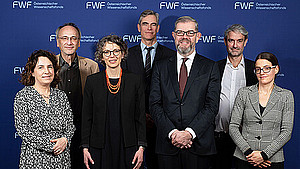What is the Excellence Initiative?
Promoting cutting-edge research on topics of the future and strengthening Austria as a center of science - these are the key objectives of the excellence initiative excellent=austria, which was launched by the Federal Ministry of Education, Science and Research. Starting in summer 2023, cooperative projects of unprecedented dimensions will be launched in Austria in the form of clusters of excellence, heralding a new era in basic research.
What is a cluster of excellence?
More freedom, more collaboration, more opportunities - a cluster of excellence is characterized by the successful combination of cutting-edge research, research-led education, promotion of the young researchers, and the national and international knowledge exchange. Equal opportunities, diversity, knowledge and technology transfer in the form of cooperation with industry and society are central concerns.
Cluster of Excellence "Knowledge in Crisis
"Knowledge in Crisis" is one of the first clusters of excellence in Austria to be selected under the Excellence Initiative following a multi-stage procedure.
Board of Directors and participating research institutions:
- Tim Crane (Director of Research, Central European University)
- Marian David (University of Graz)
- Katalin Farkas (Central European University)
- Max Kölbel (University of Vienna)
- Hans Bernhard Schmid (University of Vienna)
- Paulina Sliwa (University of Vienna)
- Charlotte Werndl (University of Salzburg)

"Knowledge in Crisis / Wissen in der Krise."
Knowledge is the ultimate human resource: without knowledge, we cannot effectively manage the environment, our cities, healthcare, governments, education systems, science, culture, and everything else. Knowledge is what makes our societies thrive and grow. But we face a crisis of knowledge today. Our claim to knowledge, both scientific and non-scientific, is threatened by the challenges of new technologies, by global political volatility, by skepticism about science, and by other, more theoretical ideas. Our collective understanding of the role of knowledge in our lives is being seriously challenged - and yet, to solve the major problems we face today, we need knowledge, and scientific knowledge, more than ever.
This Cluster of Excellence is based on the assumption that we can only systematically address this crisis by combining resources from a variety of areas of philosophy: Epistemology, Ethics, Political Philosophy, Social Philosophy, Philosophy of Mind.
Hypotheses/research questions/objectives
The cluster will examine knowledge in its most general form, with the goal of uncovering the conceptual and empirical underpinnings of the current crisis of knowledge. It will include an examination of some traditional questions - What does it mean to distinguish between truth and falsehood? How should we understand knowledge in its most general forms? Does scientific knowledge have a special authority? - combine with distinctly contemporary questions - What is the relationship between the knowing subject and its political role? How can we restore confidence in scientific knowledge? How should we connect our theoretical understanding to our practical, political, and moral needs and goals?
Approach/Methods
Research in philosophy proceeds from the systematic study of conceptual, linguistic, social, scientific, psychological, moral, and political phenomena, with the aim of giving them order and intelligibility. However, in addition to these abstract analyses of the phenomena, as well as normative proposals for dealing with the crisis, researchers in the cluster will also conduct empirical studies of the phenomena. Other parts of the cluster will elicit insights about our situation from recent philosophers, and still others will engage with policymakers outside the university and disseminate their research in other forms of public communication.
Degree of originality/innovation
The project is highly innovative. It will address the crisis of knowledge by employing ideas from a wide range of areas of philosophy in ways that have never been done before. The guiding belief is that the crisis of knowledge cannot be addressed by epistemology alone, but requires a comprehensive philosophical approach.
FWF funding volume: 8.9 million euros
More about the research groups and research questions in the project
Member of the Board of Directors:
David, Marian; Univ.-Prof. Mag. Dr.phil.
Felka, Katharina; Ass.-Prof. Dr.phil.
Melchior, Guido; Priv.-Doz. Mag. Dr.phil.
Rinofner, Sonja; Univ.-Prof. Mag. Dr.phil.
The scientists and scholars from the Department of Philosophy at the Faculty of Humanities, together with other participating researchers, are dealing in particular with four of a total of six subprojects:
The Reach of Human Knowledge [Guido Melchior et al.] Knowledge Production in the Human Mind [Ursula Renz, Martina Fürst et al.] Knowledge of Ethics and the Ethics of Knowledge [Sonja Rinofner-Kreidl et al.] Language, Truth and Knowledge [Marian David, Katharina Felka et al.]